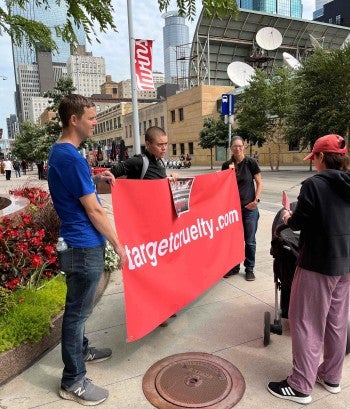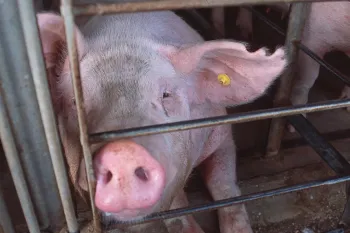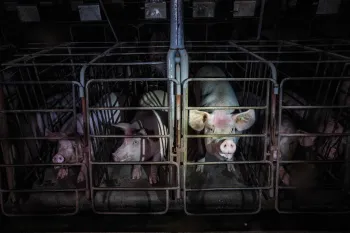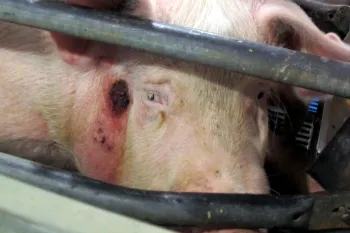Commitments to improve the quality of life for animals shouldn’t be empty promises. Since Target made its much-lauded announcement about its intentions to go cage- and crate-free for egg-laying hens and pregnant pigs, a decade has passed. The company recently announced that it would continue to sell eggs sourced from caged hens through 2025 and potentially beyond that, effectively breaking its promise on switching to cage-free eggs. And it still has not met its goal to eliminate gestation crates for pigs in its supply chain, a promise it made in 2012.
Konrad Lozinski/We Animals Media
Tell Target: Animals deserve better!
There’s no excuse for Target to be dragging its feet on these crucial issues—not when companies such as Costco, Sprouts, McDonald’s, Burger King, IHOP, Unilever, Cheesecake Factory and Nestlé, among others, are making good on their commitments, some of them even doing so ahead of schedule. For instance, McDonald’s purchased 2 billion eggs from cage-free systems for its U.S. market alone in 2023, meeting its goal early.
There is a sea change occurring in the public policy arena, too: Eleven states have already banned the use of battery cages for egg-laying hens. The public wants extreme confinement systems for farm animals to be a thing of the past.
Our view is that suppliers will step up to meet corporate demand for cage-free products, as they have already done for many other companies—yet Target claims to be having trouble reaching its goal.
On gestation crates, Target also misses the mark. Pregnant pigs in Target’s supply chain are still routinely locked for weeks at a time in cages just 7 feet long and 2 feet across. In cages like this, pigs across the country routinely suffer muscle and bone deterioration and have been documented gnawing the bars in distress until their mouths bleed.

Aaron Zellhoefer/The HSUS
We kicked off a public campaign near Target headquarters in Minneapolis last week, calling on the company to keep its farm animal welfare promises. Target’s inaction is unacceptable, and our concern for animals in its supply is echoed by Target customers nationwide.

The HSUS/The HSUS
Recent polling shows that Target customers overwhelmingly believe (82%) that chickens should be housed in open barns with no cages, and 72% of Target customers state that they’d view the company in a positive light if it followed through with its commitment to only sell eggs from hens not confined to cages. It’s no surprise that most people would oppose hens being crammed into cages roughly the size of a microwave that they have to share with up to nine other birds, and most Americans oppose pregnant pigs being locked in crates so small that they can’t even turn around.

The HSUS/The HSUS
When we achieve victories for animals at the corporate level, we follow through to make sure that promises are kept. Companies that fall short aren’t just missing the target—they are eroding public trust and preventing progress against systemic animal cruelty.
Tell Target that animals deserve better, and check out TargetCruelty.com for more ways that you can help secure better lives for chickens and pigs.
Follow Kitty Block @HSUSKittyBlock.



